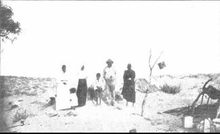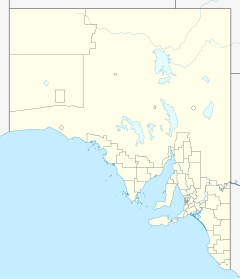Clifton Hills Station
27°01′06″S 138°53′36″E / 27.01832°S 138.89347°E

Clifton Hills Station is a pastoral lease that operates as a cattle station in the far north of South Australia.
Description
[edit]It is situated approximately 132 kilometres (82 mi) south of Birdsville and 200 kilometres (124 mi) north west of Innamincka. The property encompasses part of the Sturt Stony Desert and is located on the Birdsville Track and is the largest holding along the track[1] with an area of 17,000 square kilometres (6,564 sq mi).[2]
Goyder Lagoon, the origin of the Warburton River and the end of the Diamantina River and Eyre Creek, lies on the edge of the property.[3]
History
[edit]The station was established in 1876.[4] In 1881 the property was owned by J. H. Howie who had 1,000 cattle overlanded from Aramac Station.[5] By 1883 the property was owned by Andrew and J. Broad who were routinely sending cattle to market in Adelaide.[6] By 1891 the property was still owned by the Broads but managed by Mr. Turnbull. At this stage the property occupied an area of 4,000 square miles (10,360 km2) and was stocked with 14,000 head of cattle.[7]
In 1904 the manager was H.C. Trew who reported that the Georgina and Diamantina Rivers had emptied themselves onto the plains of the station covering come 2,099 square miles (5,436 km2) and the property was carrying 2,000 head of cattle.[8]
Clifton Hills was sold by Elder Smith and Co on behalf of the then proprietors in early July 1912. The purchasers, G and E.A. Brooks, had substantial existing holdings, including Buckland Park at Two Wells, north of Adelaide. At the time, the property was described as consisting of 3,566 square miles (9,236 km2) and carrying 9,000 head of cattle, 168 horses and being sold on a walk-in / walk out basis.[9]
The Beltana Pastoral Company sold the property Kanowna Station to G. and E. A. Brooks who already owned Clifton Hills, which adjoins Kanowna, in 1914.[10]
In 1923 both Clifton Hills and nearby Kanowana Station were still owned by G and E. A. Brooks. The holdings had a combined area of 7,000,000 acres (28,328 km2) and were stocked with approximately 20,000 head of shorthorn cattle.[11]
In 1930 the manager was Norman Gurr who reported that the rivers had flooded, that largest floods seen in the area since 1917.[12]
Hector Brooks owned the property in 1960 and was the first to sell cattle at Gepps Cross using the beef roads concept. The cattle, a consignment of 53 bullocks, were transported by truck down the Birdsville Track to the railhead at Marree. This was the first time road transport had been used along the track.[13]
The land occupying the extent of the Clifton Hills pastoral lease was gazetted as a locality in April 2013 under the name 'Clifton Hills Station' with the word 'Station' included to "prevent duplication of locality name within Australia.[14]
The property was offered for sale in 2018, reported to be for the first time in 60 years. It was described as the second-largest cattle station on Earth (after Anna Creek Station), at 16,510 square kilometres (6,370 sq mi) stocked with an estimated 18,000 head of cattle, and licensed for up to 21,500. It consists of 1,500 square kilometres (580 sq mi) annual flood area from the Diamantina River, balanced with gibber plains with creeks, and soft sandhill country.[15] The selling owners were David Harvey, Charles Simpson and Katherine Hartley. Clifton Hills Station encompassed four pastoral leases in northeastern South Australia and southwestern Queensland.[16] In late November 2018, it emerged that the station would be bought by a partnership including Viv Oldfield who already owned the adjoining Pandie Pandie Station and also bought Maryvale Station earlier in 2018. The purchase included 18,000 certified organic cattle. His cattle enterprise runs about 50,000 cattle on a collection of stations including Andado Station, Horseshoe Bend Station, and New Crown Station.[17]
See also
[edit]References
[edit]- ^ Maggie Carstairs (26 November 2012). "Clifton Hills Station Birdsville Track South Australia". Retrieved 24 August 2014.
- ^ "Blazing saddles". The Age. 11 June 2005. Retrieved 23 August 2014.
- ^ "Lake Eyre". Central Eagle Aviation. Retrieved 4 July 2015.
- ^ Lyn Leader-Elliott and Iris Iwanicki (December 2002). "Heritage of the Birdsville and Strzelecki Tracks" (PDF). Commonwealth of Australia. Archived from the original on 17 July 2004. Retrieved 7 March 2016.
{{cite web}}: CS1 maint: bot: original URL status unknown (link) - ^ "Aramac". The Queenslander. Brisbane. 9 July 1881. p. 57. Retrieved 24 August 2014 – via National Library of Australia.
- ^ "Advertising". South Australian Register. Adelaide. 5 May 1883. p. 8. Retrieved 24 August 2014 – via National Library of Australia.
- ^ "Queensland border commission". South Australian Register. Adelaide. 21 May 1891. p. 6. Retrieved 24 August 2014 – via National Library of Australia.
- ^ "Pastoral Country in great heart". The Register. Vol. LXIX, no. 17, 893. Adelaide. 19 March 1904. p. 6. Retrieved 4 January 2018 – via National Library of Australia.
- ^ "sale of Clifton Hills Station". The Advertiser. Adelaide. 4 July 1912. p. 14. Retrieved 19 November 2017 – via National Library of Australia.
- ^ "Sale of Kanowna Station". The Register. Adelaide. 14 March 1914. p. 14. Retrieved 5 July 2015 – via National Library of Australia.
- ^ "Fat Cattle found". The News. Adelaide. 27 August 1923. p. 9. Retrieved 24 August 2014 – via National Library of Australia.
- ^ "Floods in South Australia". The Barrier Miner. Vol. XLIII, no. 12, 723. New South Wales. 6 March 1930. p. 1. Retrieved 4 January 2018 – via National Library of Australia.
- ^ Richard Maurovic (2007). The Meat Game: A History of the Gepps Cross Abattoirs and Livestock Markets. Wakefield Press. ISBN 9781862547261.
- ^ "Search result for " Clifton Hills Station (LOCB)" (Record no SA0067038) with the following layers selected – "Suburbs and Localities" and " Place names (gazetteer)"". Property Location Browser. Government of South Australia. Archived from the original on 12 October 2016. Retrieved 20 May 2016.
- ^ Lane, Isabelle (18 May 2018). "The second-largest cattle station on earth - for sale in SA". InDaily. Retrieved 18 May 2018.
- ^ "Prime" Ag News (10 May 2018). "Second largest Cattle station could make $35 million". Farm Tender. Retrieved 22 May 2018.
- ^ Condon, Jon (26 November 2018). "Property: Central Australian cattleman buys Clifton Hills". Beef Central. Nascon Media Pty Ltd. Retrieved 5 January 2018.

